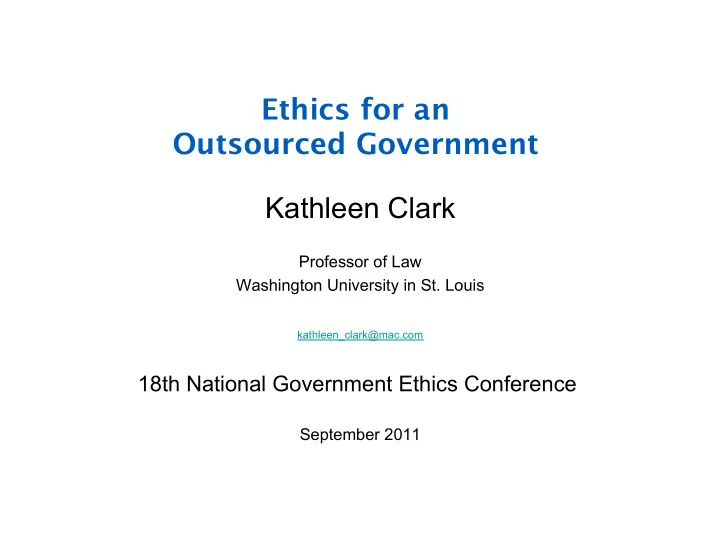

Ethics for an Outsourced Government Kathleen Clark Professor of Law Washington University in St. Louis kathleen_clark@mac.com 18th National Government Ethics Conference September 2011 0
Acknowledgment (my own conflict of interest?) This research was supported by a contract from the Administrative Conference of the United States (ACUS).
Methodology 90+ interviews with: • Contractors & their trade associations » Professional Services Council (PSC) » Defense Industry Initiative (DII) • Executive Branch o ffj cials: » Procurement » Ethics • Government Investigators » IGs » GAO • NGOs » good government groups » unions • Hill sta fg ers • False Claims Act lawyers
An Illustration of the Problem • Dan Jester – Advised Treasury on AIG bailout – Owned Goldman Sachs stock – Handled AIG bailout in a way that benefited Goldman Sachs -- and himself
Criminal Conflict of Interest Statute 18 U.S.C. § 208(a) (excerpt) “. . . [W]hoever, being an o ffj cer or employee of the executive branch . . . participates personally and substantially . . . through . . . the rendering of advice , . . . in a . . . particular matter in which , . . . he . . . has a financial interest ”
Federal Government Spending
Number of Federal Employees
Spending on Service Contracting
Spending on Services v. Products
Ethics Restrictions on Government Employees • financial influences on an employee’s government work; • the use of government position for non- government purposes; • an employee’s outside activities; • an employee’s post-government employment; and • restrictions based on an employee’s pre- government employment.
One Size Does Not Fit All • Stricter Ethics Rules for Employees in Sensitive Positions • High-Level O ffj cials • Procurement O ffj cials & Bank Examiners • Looser Rules for Temporary Employees (“Special Government Employees” or SGEs)
Principles Underlying Government Ethics Restrictions (1) Express fiduciary nature of public o ffj ce (2) Shore up public’s confidence in government (3) Maintain Congressional and executive branch control of federal resources; and (4) Ensure that o ffj cials devote adequate attention to their responsibilities.
Few Ethics Restrictions on Government Contractor Personnel • A few agencies have narrow regulations re: Contractor Employee Personal Conflicts of Interest (“PCI”) • Proposed Regulation for PCI in “Meta-contracting” -- Contractors who assist the government in contracting • Government-Wide Regulations re: Contractors’ Organizational Conflicts of Interests (“OCI”) • Contractors’ Internal Ethics Codes
Exception: FDIC • Deems contractor personnel who are supervised by government managers to be government employees • Has comprehensive ethics regulations for its contractors’ personnel – Financial influences (including interests of close family members) – Misuse of government resources (including information) – Outside activities – Post-employment
For more information: Ethics for an Outsourced Government ACUS http://papers.ssrn.com/sol3/papers.cfm?abstract_id=1840629 Fiduciary-Based Standards for Bailout Contractors: What Treasury Got Right and Wrong in TARP M INN . L. R EV . http://papers.ssrn.com/sol3/papers.cfm?abstract_id=1860184 Financial Conflicts of Interest In and Out of Government A LAB . L. R EV . http://papers.ssrn.com/sol3/papers.cfm?abstract_id=1785520
ACUS Recommendations: (1) Optional FAR clauses for contracts with high risk of: • personal conflicts of interest (COIs) or • misuse of certain non-public information. (2) Contractors must: • train employees to recognize their own COIs • require employees to report COIs internally • screen conflicted employees from contract work • disclose employee misconduct (& resulting discipline) to government (3) These clauses will not supplant already existing agency contractor ethics programs (4) Agencies not covered by the FAR should consider using these clauses
A continuing discussion . . . Questions Comments kathleen_clark@mac.com 314-827-4081 16
Recommend
More recommend